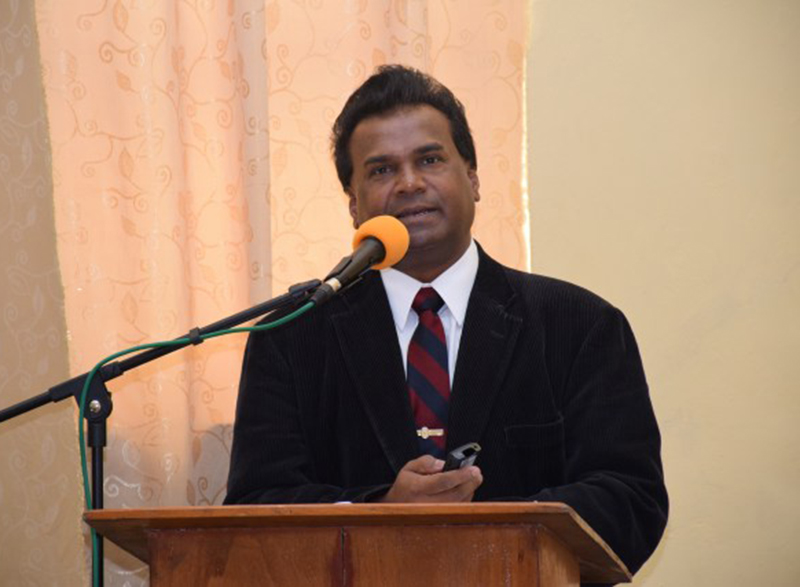The two Guyana Extractive Industries Transparency Initiative (GYEITI) reports that have been published to date do not paint a complete picture as they do not include revenue statements by the Guyana Revenue Authority (GRA), which would require a presidential waiver, National Coordinator Dr Rudy Jadoopat recently disclosed.
According to Jadoopat, GRA is prohibited by the laws of Guyana from giving tax information to unauthorised persons unless the president issues a waiver and give GRA the go-ahead to release such information. He noted that this issue was brought to the attention of the previous APNU+AFC administration and the now- PPP/C government but to date no waiver has been issued so that GYEITI can have access to the relevant information.
“To date that waiver has not been made and therefore GRA still cannot provide all of the information required for the analysis that is necessary to prepare the EITI report in the best possible way,” Jadoopat said during the virtual Guyana Extractives Industry Transparency Week programme that was hosted by the Pan American Development Foundation (PADF)-Guyana Extractive Sector Transparency Project (GYEST) project earlier this month.
The Extractive Industries Transparency Initiative is a global standard to promote open and accountable management of natural resources. Its implementation requires each adopting country to publish an annual EITI Report to disclose information on contracts and licences, production, revenue collection, revenue allocation, and social and economic spending.
Describing the process GYEITI used to compile the data for the two reports, which are available on its website, Jadoopat said that they request data from all government agencies who are recipients of revenues from the extractive sector. He noted that for the first report they requested data from the Guyana Geology and Mines Commission (GGMC), the Ministry of Finance, GRA, the National Insurance Scheme (NIS), and the Environmental Protection Agency. At the time the first report was being prepared, he said, disclosure of data was not very common so they faced some challenges and did not receive all the information they requested but GRA, which receives the most revenues from the extractive sector, did not provide any data.
He added that the multi-stakeholders group, the decision making body at GYEITI, had to improvise in the second report by totaling statements received from GGMC and the Guyana Gold Board (GGB), both of which were the largest payers of revenue in the country at that time. In addition, he said, they had to ask relevant companies to declare the amount of money paid to GRA by submitting verified and certified statements but many companies were reluctant to do so. Despite this, he said, there is still an obstacle of achieving undeniable transparency because even though they have received those statements, it still can’t be compared to GRA’s. If statements do not match then an investigation will have to be launched.
“GRA is the largest recipient… of revenues from the extractive sector, so not to include what GRA receives will actually not give you a comprehensive picture or understanding of the revenues received from the extractive sector,” Jadoopat said.
According to Jadoopat, the Commissioner of GRA is also aware of the Issue as he is on the multi-stakeholder board but there is nothing that can be done as they have to operate in accordance with the law.
“They can’t violate the law and we will not encourage that so the law must be modified or reformed so that we can have the information required to properly prepare the EITI reports. So I do hope the officials will get that sorted because the government seems to be very adamant and concerned about transparency and accountability. We have been hearing a lot of that and [we] support it so we are optimistic that we will get that in the near future or before we start preparing our next report,” he added. The deadline for the publishing of Guyana’s third EITI report for the year 2019 is December 31st, 2021. Jadoopat has said that they have commenced draft preparation for terms of reference to hire an administrator to help with the preparation in keeping with EITI standards.
Jadoopat said as per EITI standards, implementing countries are mandated to undergo oversight by the EITI International Secretariat board to ensure that the reports adhere to the EITI standards. This process is called validation.
He stated that Guyana was supposed to undergo its first EITI validation in thirty months after becoming an EITI implementing country. This was scheduled for April 2020 but due to the COVID-19 pandemic, the EITI international board made a decision to reschedule the validation of many countries, including Guyana.
The validation is now scheduled to begin July 1st, 2021. Jadoopat said that the validation will determine whether the information in the two reports published so far is enough and in compliance with EITI standards. However, he said, a large amount of revenues have not been included in the first so that would not provide a comprehensive picture of what is going on in the country regarding the revenues.
According to Jadoopat, they are in the middle of preparations for the validation.





